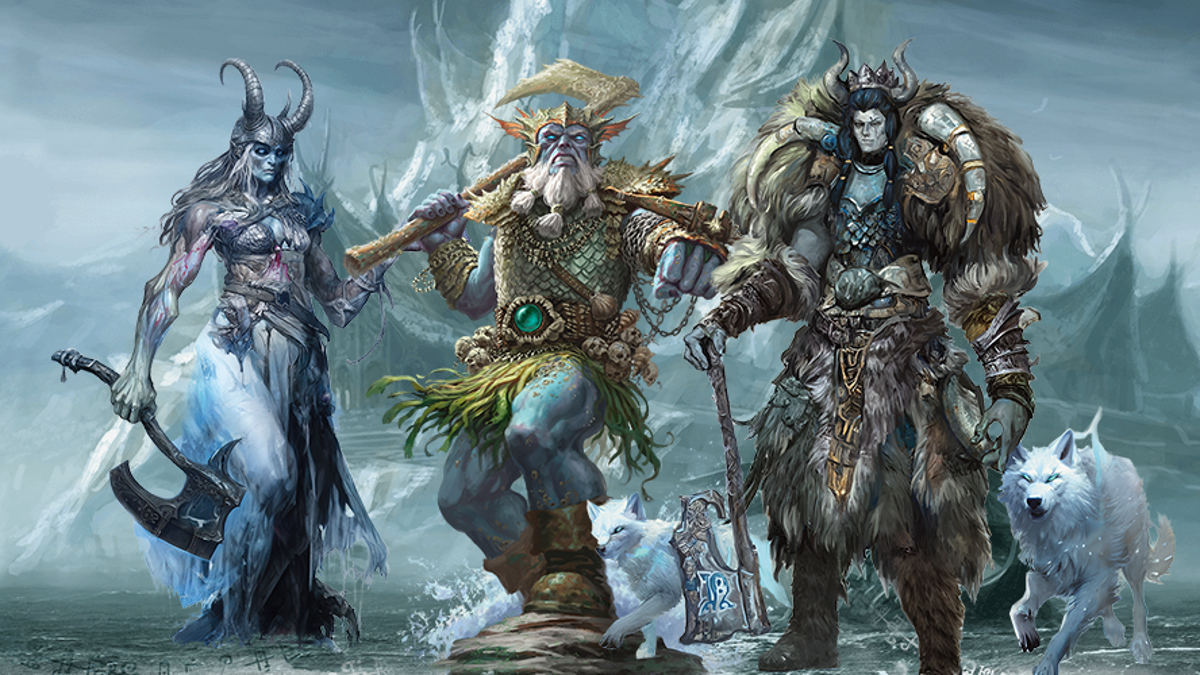- 26 Posts
- 35 Comments
They shouldn’t have included the 2nd picture then. It’s the lightest of all of them.
A tale that is perpetually dark in tone becomes tiresome very quickly. It needs to feature the occasional ray of light for contrast and to create a sense of hope. Monsters and other terrors must be offset with creatures that are kind and lovable, giving the characters even more reasons to stand against the darkness. Here are a couple of ways to add glimmers of light to a tragic tale:
- In a land as dreary as Barovia, take the time to describe the occasional scene of beauty, such as a pretty flower growing atop a grave.
- Make sure that the heroes have contact with NPCs who are honest, friendly, and helpful, such as the Martikovs in Vallaki or the Krezkovs in Krezk.
-Curse of Strahd, Introduction. Marks of Horror. 2016.

 307·3 years ago
307·3 years agoBut there are people who identify as left-wing who will support China and Russia while downplaying their authoritarianism.
That’s not something being invented as a boogeyman. Anyone can go to lemmygrad.ml right now to see it in action.

 1·3 years ago
1·3 years agoMost of that is being fixed by dilating the amount of damage output that players can output in 5e in a variety of changes in OneD&D.
My playtests have had really gripping & close fights, even with people optimizing their hearts out.

 10·3 years ago
10·3 years agoI’ve seen Sealioning used quite a bit in a particular Lemmy instance that would self describe themselves as Pro-Russia & Pro-China, as a way of shutting down discourse between people who disagree with them. There are people who disagree with a particular narrative, and they’re discounted immediately for wanting to know how someone would arrive at a pro-Russian & pro-China position.
Also they’ll just “whatabout!” and change the subject whenever unassailable critiques of these regimes come up. As if its is only possible to hold outrage in a single direction at a time.
I’ll have you know I’m capable of disliking EVERYONE mentioned in a given conversation.

 91·3 years ago
91·3 years agoYeah and as smart as anyone is, they aren’t right all the time. As much as you can agree with his messaging, it’s important to critically assess everything said, regardless of who is saying it.
Modern capitalism as we know it began forming in the Renaissance, particularly in colonial European powers who were getting to the Colonization of the rest of the world game earlier than their peers. This notably includes Portugal and the Netherlands, followed swiftly by most everyone else.
There were promissory notes that were carried by travelers prior to this, in the form of Crusaders traveling from Europe to Jerusalem, in the relatively brief period of time that it was conquered. But this did not interact with market economies as we’d know it, and is directly analogous to traveler cheques, meant to make you less of an appealing robbery target on the road.
No, these kinds of shenanigans were concocted rather recently, and are not reflective of baseline normal human behavior. It’s mostly a system that was created by accident, with conventions that were forming being purposeful altered during creation by the people with money, for their own benefit.

 1·3 years ago
1·3 years agoThanks! They look quite slick and have a lot going on. Particularly the void dragons you sent my way.
Each would be more or less perfect for a single-monster encounter, as they are dense with fairly novel mechanics.
Many people think that the WotC statblocks are a bit too boring, but I consider them a good entry point for new GMs. This is clearly a nice way to up your game.
Cheers!

 41·3 years ago
41·3 years agoCan someone give a good example if what makes these books good? I’d love to see a single great example of the level of quality that these books bring.
The NSFW posts.
IDK if they’re exactly merited in these spaces outside of a protest context. I’m also not sure they were really needed in that context either but ce’st la vie!

 3·3 years ago
3·3 years agoFor the people who have a lot of hours on this game, how well does it play for co-op?
My spouse and I actually dated doing Star Wars the Old Republic co-op, where we could play two different characters going through bespoke personal quest lines while being able to help each other out on their journies.
How easily could we get that experience with this game?

 22·3 years ago
22·3 years agoYou really should look at the homelessness crisis in more detail, because it cannot be on private citizens to shoulder that burden. There simply isn’t enough for individuals, even if they all miraculously organized together in this effort, to fix the issue.
It’s systemic, and we need top-down action. Housing people affordably is a scale issue, and larger institutions should be the ones to gather the equity and resources at a scale that individuals simply cannot, especially in the middle of a housing crisis.
For examples of public housing that works quite well, I’d suggest you read into Greek’s post World War 2 Social Housing programs, and Singapore’s state controlled housing programs.

 19·3 years ago
19·3 years agoAt whose expense?
Also, trust in the police is at an all-time low, especially among young liberal-leaning Americans.

 12·3 years ago
12·3 years agoIt’s one of those things where I look at it, and say ‘wow that sucks… But you can’t argue with the results damn, can we workshop a better version of that?’

 13·3 years ago
13·3 years agoMurdoch doesn’t own EVERY newspaper.
But yeah Murdoch media is fucked.

 16·3 years ago
16·3 years agoChina doesn’t aim for global hegemony
You are gliding over every single time that Xi Jinping said, out loud, that this is the long term goal? Why wouldn’t you believe him?
Yeah, they couch it carefully, but it’s quite clear, from the China #1 propaganda, that China doesn’t want to uplift anyone else, they want to use their soft power to make neighboring countries dependent on them. They’re following the playbook laid out by Western companies in the 20th century, but organizing it with State controlled corporations.
And as for Singapore, there’s a lot of propaganda from some right-wing Supply-Side economists that mischaracterize that country as being an ideal Capitalist state, while gliding over how the State controls most of the means of production. It isn’t an ideal system, it has many inequities. But it’s an example that serves as a surprising counterpoint to the argument that only free markets can thrive & survive in global capitalism, and components of it could be useful for looking for solutions to the issues with capitalism. Right wing economists do this, so they don’t have to confront how incorrect their argument that Capitalism cannot be reformed with the State taking a direct role in the economy without disaster.

 17·3 years ago
17·3 years agoYou say that like Russia isn’t Capitalist as all get out.
The only good counterpoint to Capitalism in the modern global landscape is Singapore, and possibly China if you’re feeling extra spicy and support their version of global hegemony.
The modern Russian state is a Fascist Autocracy propped up by Oligarchs. Y’know, what Trump likes.
Edit: Actually I’m going to add Slovenia to that as well, as I had a great time learning about that Jewel of a Country before the Delta Variant absolutely wrecked it.
When I was there in 2018, it was a fantastically eye-opening example of a successful socialist state.
But that’s where my knowledge end on counterpoints to Capitalism, in its varied forms. I’m sure more exist. I’m not an academic on this subject.

 1·3 years ago
1·3 years agoThat seems like a playful way to fill up a slow gaming-news day.
Wait this isn’t the actual article!
For everyone’s reading pleasure:
https://kotaku.com/baldurs-gate-3-halsin-romance-sex-scene-bear-karlach-1850615466

 18·3 years ago
18·3 years agoI didn’t hand curate them, I just went to google and copy/pasted in a demonstration of the lowest amount of effort I could do to find articles that dispute the narrative here.
Most of these countries have free press, btw. And some articles blame Russia, others give credence to the possibility that Ukraine could have done this, but with the realistic perspective that it’s basically impossible to know.
In fact, reading those stories makes me incredibly skeptical of anyone who doesn’t show uncertainty on this topic. Look at that, I just changed my own view by researching a bit more.















The secret is to not work from what you’d like to do, but to work backwards from what your players want to do.
Seriously, throw out all the prep you have that isn’t landing, and just ask your players what kinds of things they want to do. Then, make stories inspired by the actions or accomplishments they want to undertake.
… This does require that your players have some idea of what they want to do, though. If you have checked out or uninvested players, there’s essentially nothing you can do I’m afraid.
So now I will soapbox to the players reading this: Your job is to be invested in the game. If you don’t put energy into being invested, you’re not fulfilling your side of the arrangement at the table.